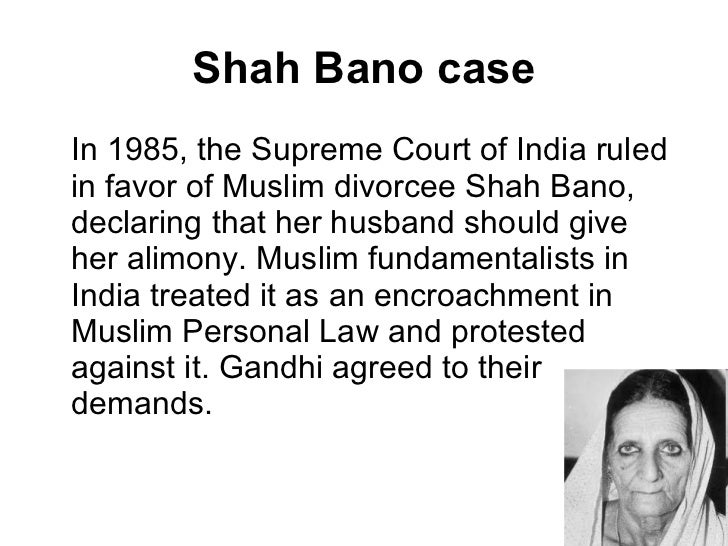Background
In India we have different personal laws governing each
community like Muslim Laws are governed by their own Personal laws, Hindu Laws
are governed by the Hindu Marriage Act, Hindu Succession Act. The personal laws
govern Marriage, Succession, Adoption, Divorce. etc.
These personal laws are not penalizing in nature. For eg, Adultery becomes a ground of divorce and Judicial Separation. But if you want your husband to be punished for adultery, you have to resort IPC ( Indian Penal Codes). Personal Laws are also called Family laws.
These personal laws are not penalizing in nature. For eg, Adultery becomes a ground of divorce and Judicial Separation. But if you want your husband to be punished for adultery, you have to resort IPC ( Indian Penal Codes). Personal Laws are also called Family laws.
Understanding the Shah Bano Case
· Shah Bano married Ahmad Khan (advocate) 1932
· Children- 3 sons & 2 daughters
· After 14 years he married a younger woman
· In 1975 Ahmad khan drove out of her matrimonial home in 1975.
Her age was 62 years.
· She filed a petition for maintenance in April 1978
under section 125 CrPC because he had stopped
giving her maintenance of Rs 200 which he had promised.
· Basically u/s 125 CrPC -->> A wife
who is without any income, has no source of income and is neglected by her
husband is entitled to maintenance, which includes a divorced wife who is not
remarried.
· On November 1978 her husband gave an
irrevocable talaq (divorce) to her and took up the defence that since
Bano had ceased to be his wife so he was under no obligation to provide
maintenance for her.
· The Magistrate court directed Khan to pay Rs 25 per month to Shah Bano.
· This amount was enhanced by the revisional
application to High Court in Madhya Pradesh for Rs 179
· Ahmed Khan however approached against the judgment to Supreme
Court. His main contention being that after divorce any form of
relation with his divorced wife is Haram and against Islam thus he is not
liable to maintain her.
Judgement
- On 3 February 1981, the two judge bench first heard the matter, in light of the earlier decisions of the court which had held that section 125 of the Code applies to Muslims also, referred Khan's appeal to a larger Bench.
- Muslim bodies All India Muslim Personal Law
Board and Jamiat Ulema-e-Hindjoined
the case as intervenor.
On 23 April 1985, Supreme Court in a unanimous decision,
dismissed the appeal and confirmed the judgment of the High Court.
This was a historic Judgment which
reinforces your faith in Judiciary where Justice comes before Religion,
Equality comes before religion, Righteousness comes before Religion. This was a
milestone in the History of Judiciary, It was a bold, brave and impartial
Decision.
Reaction to the Judgment

- Voluble orthodoxy deemed the verdict as an attack on
Islam.
- Muslims took to streets, they felt threatened !
The DIRTY politics played !!
- In the Indian general election, 1984, Indian National Congress had won absolute majority in the Indian parliament.
- After the Shah Bano judgment, there was
uproar in the Muslim community, fearing that the Congress will face
decimation in the polls, Congress headed by the then prime minister Rajiv
Gandhi enacted an act titled The Muslim Women(Protection of Rights on
Divorce) Act 1986 that nullified the Supreme Court's judgment in the Shah
Bano judgment.
 |
- Diluting the Supreme Court judgment, the
act allowed maintenance to a divorced woman only during the period of
iddat, or till 90 days after the divorce, according to the provisions of
Islamic law.
- This was in stark contrast to Section 125 of the Code. The
'liability' of husband to pay the maintenance was thus restricted to the
period of the iddat only."
Shah Bano Case - Water Shed Moment
While the achievements of the Shah Bano Case were diluted, it
continues to remain a watershed moment because
(A) The judgment definitely mainstreamed
the discourse on the pitiful condition of Indian women. Maintenance
is the tip of the iceberg for there remain many other provision in the statute
books, which discriminate against women.
(B) While, the judgement was concerned with the rights of Muslim
women in particular, it strengthened Women's
movements of all hues fighting for justice and equality.
(C) In fact, it triggered introspection
in many other personal laws.
(D) The subsequent ruling of the SC in
Daniel Latifi which harmoniously constructed Muslim women's right to
maintenance under CrPC and Sharia, drew strength from the observations of the
Court in Shah Bano.
(E) Most importantly, the said case
highlighted the need for the enactment of the Uniform Civil Code, as propounded
under A. 44 of the Constitution.
(F) On the flipside, the Shah Bano judgment gave impetus to the
forces of communalism in India. While the ruling was opposed by the certain
sections among Muslims, the subsequent law was seen as a means of appeasement
by section among the Hindus. As a consequence, the debate over UCC
has become divisive and communally charged.
While, the UCC is important to effectively uphold the idea of
secularism in the truest sense of the word, it cannot become a means of the
majority forcing its will upon the minority. It is therefore, proposed that a
consensus building approach be adopted so as to enable the taking into account
of the diverse views on this emotionally charged issue.

